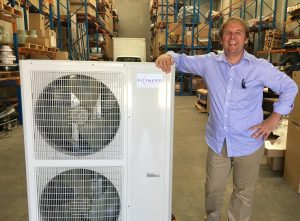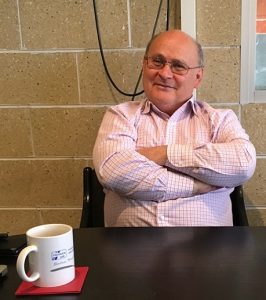
We all love airconditioning – where would we be without it when it’s too hot or freezing cold.
But unfortunately a massive amount of power is used up by airconditioning to keep us comfortable all year round at home, work or while out shopping.
Around 60 per cent of all electricity used in an average shopping centre for example is for the airconditioning.
And that isn’t good for the planet.
The industry’s environmental footprint is even bigger when you add the use of synthetic carbons as refrigerants.
But with global warming looming as a serious and growing existential threat to humanity, the airconditioning industry is starting to reflect on its impact on the environment and how it should respond.
Its guide is the Montreal Protocol signed by 197 countries and which sets out a mandatory timetable for the phase out of ozone depleting substances such as synthetic refrigerants.
The aim is to avoid at least 0.5 degrees Celsius in global warming.
Naturally there is some resistance to change, but one airconditioning manufacturer who has taken up the fight to help stop global warming is George Haydock, the general manager of Pioneer International.
Mr Haydock fervently believes that reducing the global warming impact of airconditioning will mean more to the environment than changing all the cars to electric.
Pioneer has stopped using fluorocarbons as refrigerants, replacing them entirely with hydrocarbons, which do not add to global warming – and also use less power.
But Pioneer has also over the past two years developed new patented technologies which have made their airconditioning products among the most efficient in the world.
Guess where Pioneer is located?
Yes, that’s right, here in Campbelltown.
Minto to be exact.
Earlier this year Pioneer International won the airconditioning contract for Marketfair Campbelltown, which was undergoing extensions.
The result, says George Haydock, is that Marketfair now boasts an airconditioning system that is more efficient than anybody else in the world.
“Right here, in Campbelltown, we have the world’s first hydrocarbon shopping centre,’’ he says.

“What the Europeans and the Americans are talking about trying to do, we have done it – in Campbelltown.
“We have reduced the power of that air conditioning system at Marketfair Campbelltown by 70 per cent.
“We have made it more environmentally friendly.
“So this little organisation in Campbelltown is leading the world,’’ says George Haydock.
Pioneer has been in Macarthur for almost 20 years, first in Ingleburn and now Minto.
In the past two years it has invested a lot of time and effort into new technology.
It’s part of Pioneer’s plans for a listing in the stock exchange and a bigger slice of the Australian and international airconditioning market.
Pioneer earlier this year hired the astute Nicholas Smolonogov, the former Campbelltown Council business manager, as part of the strategy.
[social_quote duplicate=”no” align=”default”]“Talking to George it became evident to me that this guy’s a winner,’’ says Mr Smolonogov.[/social_quote]
“I see Pioneer International as being quite different from others, because other companies talk about win win.
“In Pioneer it is win win win, and what I mean by that is there is benefit for Pioneer through selling the product, and a win for the end user for getting a good product at a reasonable cost, but there is also a win for the environment because of the use of natural refrigerants by Pioneer – so it has a positive impact on global warming,’’ he says.
“The other thing is that people who work with the industry can go in with confidence and service the Pioneer machinery without the fear that if the refrigerant leaks it will turn into hydrogen fluoride.
“But there’s another benefit – the majority of the synthetic gases are imported, so there’s an economic benefit for Australia as an economy,’’ says Smolonogov.

George Haydock says that in in the year 2000, when the Sydney Games were on, they brought the first hydrocarbon refrigerator to Australia in a bid to make it a “green’’ Olympics.
“They brought all these fridges in for the Games and after they took them all away again,’’ he says.
“Now, 16 years later, if you go in to buy the latest domestic refrigerator that’s energy efficient it’s not because it’s got a better compressor or better heat exchanger it’s because it’s running on R600A, a natural refrigerant.
“We’re now taking that technology and building it into airconditioning and heat water pump systems.’’
George Haydock, the man behind some of the world’s most efficient airconditioning systems, tells me that he was “never that bright at school’’.
“I came across and worked in my parents’ company and was deciding if I was to become an electrician, refrigeration mechanic or a plumber,’’ he says.
“And I probably picked the industry that makes me the least money – I’m a refrigeration mechanic.
“I actually now teach refrigeration and for the future it’s probably a wonderful career because the world is going to change so rapidly and it’s going to be the refrigeration side that’s going to do a lot of work to save energy efficiency and on the refrigerants that are causing the problem to the atmosphere.
[social_quote duplicate=”no” align=”default”]“Here at Pioneer all of us here are excited about airconditioning, we have a passion for constantly reviewing and updating, and it’s like a David and Goliath challenge – we’re the little guys, we get excited about building products that outperform the big guy.[/social_quote]
“And being the little guy you can do things faster.’’

Air conditioners use 60% of all electricity in the world? Really? Got a source for that?
Robert Polimeni